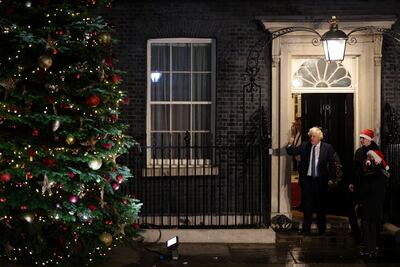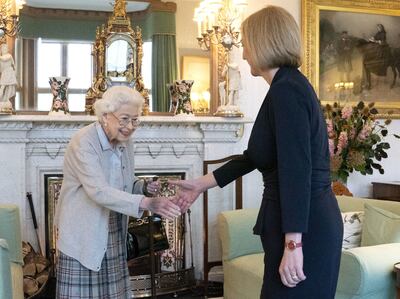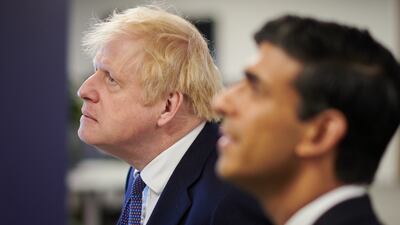When Boris Johnson switched on the Christmas lights attached to the six-metre tree in Downing Street last year he asked the gathered children a question with a seemingly straightforward answer.
“Do you think this Christmas will be considerably better than last Christmas?” the prime minster asked.
“Yes!” the excited voices answered.
Britain was nervously watching the new Omicron variant of Covid-19, unsure if vaccinations would work but knowing that 2021 had been another slog through lockdowns and job uncertainty.
But the man who had led throughout the pandemic had no such misgivings about his own post. An 80-seat majority in parliament, reasonable showings in the polls and he had seemingly brushed off allegations of lockdown-breaching parties in the building behind him.
But now, 12 months on, the man who returned to No 10 Downing Street on Wednesday after a short Christmas break was Rishi Sunak, previously Mr Johnson's neighbour as Chancellor of the Exchequer. The lessons from his predecessor but one ― Liz Truss was briefly prime minister in the autumn ― could shape the pressures Mr Sunak will face in 2023.

The signs then suggested that 2022 would be a year of recovery and rejoicing, but it turned out to be one of the most grimly momentous years of turmoil in British and European politics.
Calculated or otherwise, Mr Johnson seized the opportunity to show statesmanlike leadership when he supported Kyiv with weapons and money after Russia invaded.
As Ukraine fought for its life, the Partygate scandals appeared to dissipate, replaced by a furore over increasing national insurance contributions by 1 per cent and a £15 billion package to help poorer people.
But Russia’s failures meant the focus turned back on Mr Johnson, with the many slights from MPs in his own party resurfacing.
Boris Johnson's time as British Prime Minister - in pictures
The prime minister became the first in office to be given a fixed penalty fine ― for breaking lockdown rules ― as was his chancellor, Mr Sunak.
The much-awaited Sue Gray report on Partygate raised troubling questions on the abnegation of leadership at the top of government.
As the political temperature rose Mr Johnson went for an eight-day foreign summit dash to Germany, Rwanda and Spain hoping the international stage would provide respite and time to forget.
Alas, he arrived home to the brewing scandal involving groping allegations against his deputy chief whip, Chris Pincher.
His obfuscation tricks finally ran their course after Mr Johnson claimed he had not been warned about previous complaints against Mr Pincher, only for a retired senior civil servant to very publicly contradict him with irrefutable evidence.
Ministers bolted from his cabinet quicker than horses from a blazing stable. Holed up in the house upon which he had brought so much disrepute, Mr Johnson finally resigned in July.
A scorching summer of endless leadership debates ensued.

The winner, Ms Truss, travelled to Balmoral Castle to formally take power only for Queen Elizabeth II to die two days later.
Mourning and world leaders descended on London, forcing a political hiatus. The queen was buried and Ms Truss unearthed her baffling policy of unfunded tax cuts to stimulate growth.
The markets disagreed, the pound crashed, as did many mortgages and she was out of office within 50 days.
Mr Sunak became the first British-Asian prime minister, his main focus to repair the damage of the last two incumbents.
Stability of sorts arrived, bar the possibility of a general strike by public sector workers on top of a cold snap that could well test Britain’s energy resources.
Mr Johnson’s promise of Christmas cheer in 2022 suffered the same fate as most of his pledges. Yet there is some optimism that his cherished Brexit may be heading to a sensible conclusion.
A more balanced relationship between Mr Sunak and Europe’s leaders could at last deliver an agreement in 2023 that resolves much of the distrust and lost trading opportunities.

































































